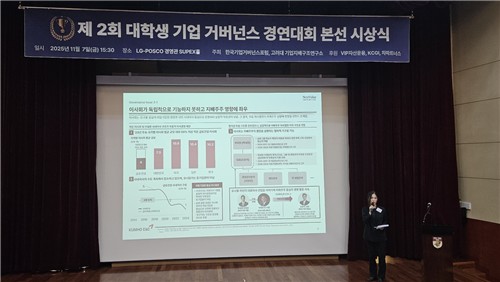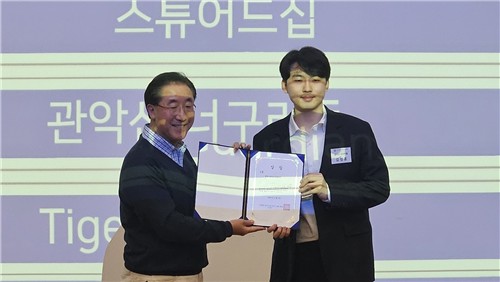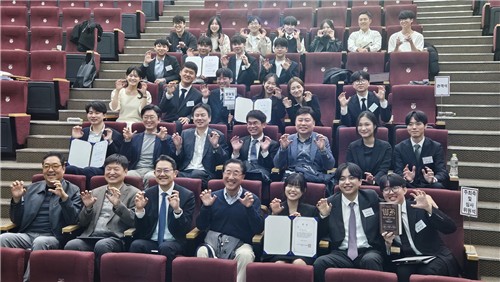(Seoul=Yonhap Infomax) — "The actual ROE (Return on Equity) could be higher, but controlling shareholders are extracting returns due to the separation of ownership and control," and "Resolving governance risks and restoring market trust will lead to lower capital costs."
These were not the words of seasoned analysts or activist funds. Instead, they came from participants at the 2nd University Corporate Governance Competition, held on the 7th in Seongbuk-gu at Korea University.

Jointly hosted by the Korea Corporate Governance Forum and Korea University’s Center for Corporate Governance, the event aimed to foster interest and debate on corporate governance among university students. A total of 26 teams from across the country participated, with five teams (one from Seoul National University, one from Yonsei University, two from Korea University, and one from Hongik University) advancing to the finals after a rigorous blind review by experts.
The competition focused on proposals to improve governance at specific companies. Teams were evaluated on their understanding of corporate governance, factual research, creativity and validity of conclusions, and the feasibility of their recommendations.
Each team was given 15 minutes for their presentation and 10 minutes for Q&A. From the outset, the atmosphere was intense. The presentation materials rivaled those of professionals in the financial sector, and the analyses were incisive.
Participants sharply criticized outdated governance structures at their target companies, highlighting issues such as unfair internal transactions leading to wealth transfers among shareholders, criminal conduct by controlling shareholders, and boards lacking independence. One team drew particular attention by benchmarking cost ratios against competitors to estimate the scale of private benefit extraction. When proposing solutions such as strengthening board independence or restructuring group governance, teams demonstrated a keen awareness of practical realities.
After two hours and five presentations, it was impossible to predict the winner. The competition was fierce. Judges deliberated beyond the scheduled time before reaching a decision.

The top prize went to "Gwanaksan Raccoons." Kim Sung-hoon, a senior at Seoul National University’s business school and the team’s presenter, said, "Preparing for the competition, I realized that while many Korean companies still have poor governance, those with strong governance are properly valued by the market, showing there is ample room for improvement." Kim plans to pursue graduate studies in corporate finance and governance at the same university next semester.
Kim explained with a smile that the team name was inspired by his fondness for "Neoguri," a flagship ramen product from Nongshim Co., the subject of their analysis.
Lee Nam-woo, Chairman of the Korea Corporate Governance Forum, commented, "I was surprised by the participants’ high level of understanding," and advised, "When evaluating governance, it’s important to consider the company’s industry, long-term trends, and both domestic and international competitors."
By the time the awards ceremony concluded, dusk had fallen outside. Despite it being a Friday evening, no one showed signs of fatigue. The judges’ faces reflected pride during commemorative photos, while the participants’ passion was unmistakable. (Industry Desk, Kim Hak-seong)

hskim@yna.co.kr
(End)
Copyright © Yonhap Infomax Unauthorized reproduction and redistribution prohibited.

